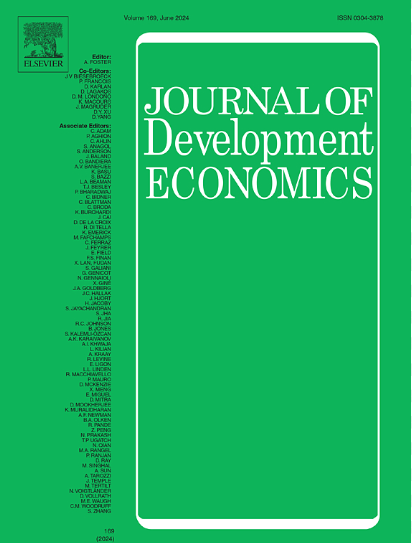Trade liberalization and quality upgrading: Third-country effects
IF 4.6
1区 经济学
Q1 ECONOMICS
引用次数: 0
Abstract
This paper theoretically and empirically shows that trade liberalization can have serious effects on firms within a third country which was not party to the trade liberalization, but which previously benefited from the trade barrier in trading with the liberalizing country. The liberalization increases competition for exporters in the third country, just as it does for firms in the liberalizing country. When a policy of liberalization is implemented towards a country that specializes in low quality products, mid-productivity firms respond by upgrading the quality of their exports to escape intensified competition. I empirically test this theoretical finding by analyzing how Turkish firms responded to the elimination of EU quotas on China in 2005. Following this trade liberalization, the unit value of the products exported by mid-productivity Turkish firms to the EU increased by 8 percentage points more than that of the control group. This upward adjustment in the unit value of exports was accompanied by a 3 percentage point increase in the average unit value of imported inputs.
贸易自由化与质量提升:第三国效应
本文从理论和实证两方面表明,贸易自由化会对非贸易自由化缔约方的第三国企业产生严重影响,但这些企业在与贸易自由化国家的贸易中曾受益于贸易壁垒。自由化增加了第三国出口商的竞争,就像自由化国家的公司一样。当对一个专门生产低质量产品的国家实施自由化政策时,中等生产率的公司的反应是提高其出口产品的质量,以逃避激烈的竞争。我通过分析土耳其企业对2005年欧盟取消对华出口配额的反应,对这一理论发现进行了实证检验。在这一贸易自由化之后,中等生产力的土耳其公司出口到欧盟的产品的单位价值比对照组增加了8个百分点。在出口单位价值向上调整的同时,进口投入的平均单位价值也上升了3个百分点。
本文章由计算机程序翻译,如有差异,请以英文原文为准。
求助全文
约1分钟内获得全文
求助全文
来源期刊

Journal of Development Economics
ECONOMICS-
CiteScore
8.30
自引率
4.00%
发文量
126
审稿时长
72 days
期刊介绍:
The Journal of Development Economics publishes papers relating to all aspects of economic development - from immediate policy concerns to structural problems of underdevelopment. The emphasis is on quantitative or analytical work, which is relevant as well as intellectually stimulating.
 求助内容:
求助内容: 应助结果提醒方式:
应助结果提醒方式:


